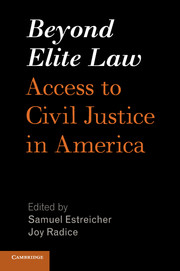Book contents
- Frontmatter
- Contents
- Beyond Elite Law
- Foreword
- List of Contributors
- Overview
- Overview
- PART I CURRENT STATE OF ACCESS TO LEGAL SERVICES
- PART II SOURCES OF LEGAL SERVICES ASSISTANCE FOR WORKING AMERICANS
- 10 Evolution of Legal Services in the United States: From the War on Poverty to Civil Gideon and Beyond
- 11 The Effect of Contingent Fees and Statutory Fee-Shifting
- 12 The Market for Recent Law Graduates
- 13 Clinical Legal Education and Access to Justice: Conflicts, Interests, and Evolution
- 14 Loan Repayment Assistance and Access to Justice
- 15 Federally Funded Civil Legal Services
- 16 New York's Lawyer Referral Services
- 17 Growth of Large Law Firm Pro Bono Programs
- 18 Institutionalizing Pro Bono
- 19 Pro Bono as a Second Career
- 20 Employer-Provided Legal Services for Employment Claims
- 21 Company-Provided Legal Services
- 22 Individualized Justice in Class and Collective Actions
- PART III FASHIONING A REFORM AGENDA
- PART IV CREATING A CULTURE OF SERVICE
- Index
19 - Pro Bono as a Second Career
from PART II - SOURCES OF LEGAL SERVICES ASSISTANCE FOR WORKING AMERICANS
Published online by Cambridge University Press: 05 May 2016
- Frontmatter
- Contents
- Beyond Elite Law
- Foreword
- List of Contributors
- Overview
- Overview
- PART I CURRENT STATE OF ACCESS TO LEGAL SERVICES
- PART II SOURCES OF LEGAL SERVICES ASSISTANCE FOR WORKING AMERICANS
- 10 Evolution of Legal Services in the United States: From the War on Poverty to Civil Gideon and Beyond
- 11 The Effect of Contingent Fees and Statutory Fee-Shifting
- 12 The Market for Recent Law Graduates
- 13 Clinical Legal Education and Access to Justice: Conflicts, Interests, and Evolution
- 14 Loan Repayment Assistance and Access to Justice
- 15 Federally Funded Civil Legal Services
- 16 New York's Lawyer Referral Services
- 17 Growth of Large Law Firm Pro Bono Programs
- 18 Institutionalizing Pro Bono
- 19 Pro Bono as a Second Career
- 20 Employer-Provided Legal Services for Employment Claims
- 21 Company-Provided Legal Services
- 22 Individualized Justice in Class and Collective Actions
- PART III FASHIONING A REFORM AGENDA
- PART IV CREATING A CULTURE OF SERVICE
- Index
Summary
Retried attorneys are an untapped source of legal assistance. Steven Bennett discusses how nonprofits, legal services organizations, and law schools could engage a generation of lawyers and navigate them to a second legal career to help meet the civil legal needs of the poor and middle-income Americans.
Long viewed as an “untapped resource,” employment of senior and otherwise retired lawyers, on a pro bono or “low bono” basis to fill the “justice gap” in America has become especially important in light of recent economic developments and government funding limitations. The “baby boomer” generation, now entering traditional retirement years, has increasingly adopted an “active” approach to retirement, with the expectation that “second (or even third) acts,” often including public service, will become the norm for retirees. Any predictions that this huge force of retired attorneys can single-handedly alleviate the nation's legal assistance crisis, however, would be exaggerated. While such lawyers may help reduce the problem, they cannot alone solve it. Instead, policies aimed at efficiently harnessing as much of this potential resource as possible must be the central focus for policymakers, social service professionals, and bar leaders. This chapter addresses some fundamental realities that will determine the shape of such efforts.
RECRUITMENT
Despite decades of efforts, the reality remains that most lawyers (active or retired) do not focus on serving low-income populations. Those who take on pro bono obligations, moreover, often are recruited into the process (versus finding opportunities on their own). The best predictor of future pro bono activity is prior experience with pro bono activity. Successful transition of retired lawyers into pro bono participation thus may turn on the ability of programs to identify appropriate target populations, and recruit them, before retirement, into the world of volunteer work. Programs that recruit volunteers at law firms, for example, may also aim at helping lawyers, as they retire, transition into more pro bono activities. Effective recruitment, moreover, may turn on finding “champions” for pro bono activity, who can help influence their peers through direct communications. Senior lawyers may be particularly adept at such peer recruitment.
Lawyers differ in their background and experiences, and in their inclinations toward public service. Levels of commitment to pro bono work, in particular, may vary greatly.
- Type
- Chapter
- Information
- Beyond Elite LawAccess to Civil Justice in America, pp. 296 - 303Publisher: Cambridge University PressPrint publication year: 2016

